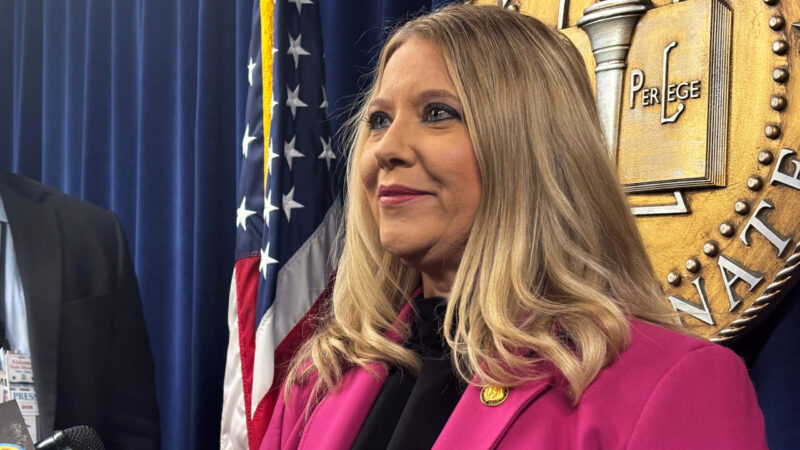Problems in Alabama’s Prisons Pose Challenges For The State
It’s been an eventful week for the Alabama Prison System. On Tuesday, Governor Robert Bentley announced initial plans for rebuilding the state’s overburdened and underfunded prison system.
Governor Bentley said Alabama would work in partnership with private agencies and the government to examine the prison system and suggest reforms. Bentley’s announcement came on the same day the Southern Poverty Law Center released a highly critical report on medical care in Alabama prisons.
This all follows a scathing Department of Justice report released earlier this year, detailing cases of rape and sexual abuse at the Julia Tutwiler Prison for Women.
For WBHM, Les Lovoy outlines the numerous challenges facing Alabama’s prisons, and what the state is doing to solve the problems.
For some women, Julia Tutwiler Prison for Women is home. Unfortunately, for others, it’s much more.
According to Marsha Colby, her time at Tutwiler was “definitely a hell on earth.” Today Colby lives with her husband and teenage kids, in Sumerford, a quiet rural community about an hour and a half north of Birmingham. In 2007, she was convicted of capital murder and spent 5 years in Tutwiler. Her conviction was eventually vacated. Colby pleaded to a lesser crime and was released.
She describes the conditions and over-crowding as horrendous, and says the guards’ treatment was particularly harsh.
“The verbal abuse, just downgrading, continuously downgrading them,” she remembers. “I know several deaths that probably could have been avoided. It’s done emotional damage, more than what I would have ever thought.”

Charlotte Morrison is a senior attorney at the Equal Justice Initiative in Montgomery. The EJI originally brought abuses at Tutwiler to the Justice Department’s attention. She says part of the problem is that some guards have a long history of abusing female inmates.
“New staff comes in, young staff, who look up to these folks, folks who are training them, who are helping them understand how to deal with problems in the prisons and how to respond to them” she said. “They’re trained by those officers.”
Another huge problem facing Alabama is overcrowded prisons. Alabama has the third highest incarceration rate in the U.S. Yet the state hasn’t set aside the funds to deal with the increase in population, and has no plans to build new prisons.
Alabama’s prisons do have some bright spots. At J.F. Ingram State Technical College’s programs inside Tutwiler, women are involved in life skills and vocational skills programs. It’s preparing them for jobs after prison, in fields from welding to cosmetology.
But despite programs like these, critics say the prison system isn’t doing enough to help inmates get ready for life on the outside. Carol Gundlach is a policy analyst for the Arise Citizen’s Policy Program Network. It’s a non-profit agency, which studies crime as it relates to poverty. Gundlach wonders if the prison system could do better with the $17,000 per year they spend on each prisoner.
“I keep thinking that we can send people to college for what we’re keeping, sending them to prison, she explained. “And, I just think the public really needs to ask themselves, is this what we want. Do we want a state where we lock up a lot of people for a long time at a lot of expense to the rest of us, or can we figure out a better way to do this.”

An abusive culture in some state prisons. Overcrowding and not enough money for new facilities. A lack of resources to provide inmates with programs that can prevent recidivism.
It’s a tall order for Kim Thomas, Commissioner of the Department of Corrections. He’s trying to find solutions. Appointed in January of 2011, Thomas is scrambling to right wrongs that have been going on for decades. He says the responsibility and solutions to current problems extend past just his department.
“It takes all the branches of government, both political parties working together and it involves the locals too,” Thomas said. “The district attorneys need to be involved in helping solve the problem. The locals with respect to starting a community corrections program, so everybody needs to get to the table and solve these issues.”
One way of addressing the problems is the legislature’s creation of a new task force — The Justice Reinvestment Initiative. State Senator Cam Ward, of Alabaster, is chair of the new task force. Ward’s also the chairman of Alabama’s Prison Oversight Committee. He notes that in 12 years in the legislature, it’s the first time the state has taken prison reform seriously.
According to Ward, “Ninety percent of the issues are awareness and recognizing the problem.”
And Ward says that’s significant.
“I think what it does is, it’s going to give us a blueprint to go forward,” Ward noted.
Governor Bentley has said several outside agencies will be helping create that blueprint. The state is working with the Department of Justice, the Pew Charitable Trust, and the Council of State Government’s Justice Center.
However, if the 2015 legislative session doesn’t make substantial changes in Alabama’s prisons, the Justice Department could very well take over the system.
Alabama seek to bring back death penalty for child rape convictions
Alabama approved legislation Thursday to add rape and sexual torture of a child under 12 to the narrow list of crimes that could draw a death sentence.
What a crowded congressional primary in N.J. says about the state of Democrats
The contest is one of the first congressional primaries of the year where we will find out what issues are currently resonating with some Democratic voters. Here are some key things to know.
At NOCHI, students learn the art of making a Mardi Gras-worthy king cake
With Carnival in full swing, the New Orleans culinary school gave its students a crash course — and a rite of passage — in baking their first king cake.
The Winter Olympics in Italy were meant to be sustainable. Are they?
Italy's Winter Olympics promised sustainability. But in Cortina, environmentalists warn the Games could scar these mountains for decades.
Their film was shot in secret and smuggled out of Iran. It won an award at Sundance
Between war, protests and government crackdowns, the filmmakers raced to finish and smuggle their portrait of Tehran's underground arts scene to the prestigious film festival.
Day 5 of search for Nancy Guthrie: ‘We still believe Nancy is still out there’
The FBI is offering a reward of up to $50,000 for information leading to the recovery of Guthrie and/or the arrest and conviction of anyone involved in her disappearance.






